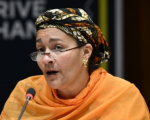In an op-ed in 'The Guardian,' Amina Mohammed, UN Special Adviser on Post-2015 Development Planning, identifies four key areas for a post-2015 development agenda that is "realistic yet ambitious," and offers other recommendations, drawing on lessons learned from the Millennium Development Goals (MDGs).
 25 November 2014: In an op-ed in ‘The Guardian,’ Amina Mohammed, UN Special Adviser on Post-2015 Development Planning, identifies four key areas for a post-2015 development agenda that is “realistic yet ambitious,” and offers other recommendations, drawing on lessons learned from the Millennium Development Goals (MDGs).
25 November 2014: In an op-ed in ‘The Guardian,’ Amina Mohammed, UN Special Adviser on Post-2015 Development Planning, identifies four key areas for a post-2015 development agenda that is “realistic yet ambitious,” and offers other recommendations, drawing on lessons learned from the Millennium Development Goals (MDGs).
The four elements that the post-2015 development agenda must start with, she writes, are: the declaration of an inspirational vision for the future, “made plain”; a practical plan of goals, targets, and indicators for that declaration; a renewed global partnership and means to implement that plan; and a framework to review and monitor implementation.
Stressing that the post-2015 development agenda must apply to all countries, Mohammed says, “The sustainable development agenda cannot only be about a handful of poor countries but must instead be universal.” She says both developed and developing countries must do their part, and development goals should be tailored to be relevant to each country and region.
Mohammed also calls for re-thinking the way the UN and other actors engage in development, deliver value, and remain relevant and effective partners. She notes the need to look at the root causes of development and to build institutions that address them over the long term. Calling for governments, donors, civil society and the private sector to be “fit-for-purpose,” Mohammed hopes that they will “do things differently to respond to – and involve – the people we say we are trying to represent.”
On the private sector, Mohammed calls for a partnership among public institutions and private organizations that integrates “visions, values, plans, accountability, resources, and knowledge sharing,” in order to deliver meaningful benefits to society.
Finally, Mohammed emphasizes the importance of engaging young people and marginalized groups with “vision, ability, and energy” to lead a transformation in development, and the need to leave no one behind.
Mohammed is leading the preparation of the UN Secretary-General’s synthesis report on the post-2015 development agenda, which is expected to be issued to UN Member States in December 2014. Intergovernmental negotiations on the development agenda are expected to begin in January 2015. [The new development agenda: six priorities from Amina J. Mohammed] [IISD RS Sources]